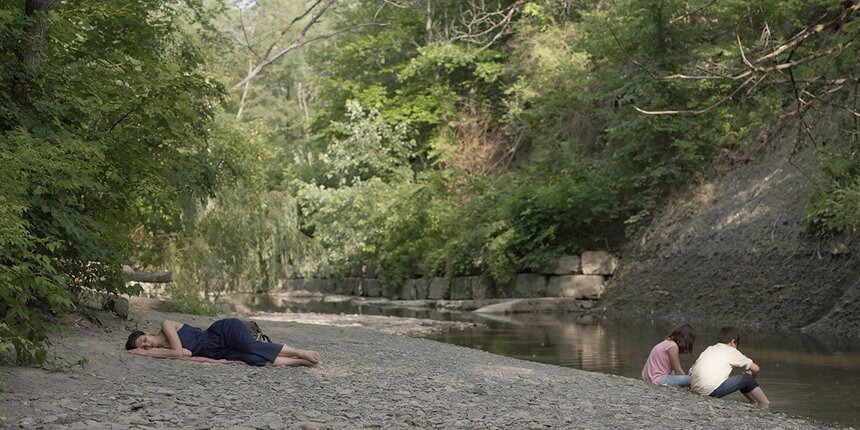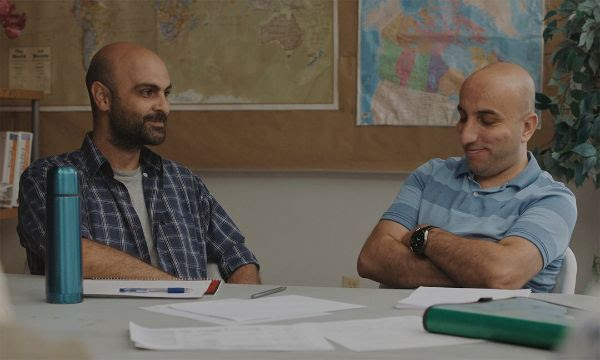CONCRETE VALLEY Review: The Quiet Lives of Those Trying to Fit In

Urban parkland can bring both solace and anonymity. For someone who is new to a place, connecting with their environment can be at once daunting and daring - the constructed landscape being one against which an immigrant is often antagonized, given how they can stand out. But the natural space might offer someone a moment of respite, to be themselves in a commonality of nature, even as you might struggle to find the necessary rhythm to your new life.
Antoine Bourges, a French filmmaker transplanted to Canada, looks at immigrants trying to find their rhythm in his new film Concrete Valley. Part documentary, part drama, he enlists non-professional actors to move and examine that in-between life of the newly arrived, the people who are trying to find their footing after having been forced to leave their old life behind. Set in a corner of Toronto likely known only to those who live there, its minimalist style belies its deep emotional cadences, with characters struggling against a tide of despondancy.
Farah (Amani Ibrahim), an actor, and her husband Rashid (Hussam Douhna), a doctor, have escaped Syria with their son, and ended up in Canada. Specifically Thorncliffe Park, a neighbourhood in Toronto with huge, anonymous apartment blocks that house a large number of immigrants and refugees, newly arrived. The hot water isn't working, Rashid is not able to practice medicine here, and Farah can only find work as a local discount retail store. The neighbourhood happens to be next to the Don Valley, a ravine park system accessible to the public, providing some needed shade and beauty as the couple try to understand who they are in this new existence.
Rashid's days are spent in an english-language class, where he tries to find some light hearted moments; in watching his son play vairous sports; and in trying, in any way he can, to practice medicine. A conversation about the lack of hot water in their apartment leads to discovering that one of the building's janitors also is unable to practice his trade. This is a common problem in Canada, so many immigrants come and are denied the chance to contribute to the best of their ability (even as their professions are desperately needed), and that leaves so many bright and capable people lost and tired. He ends up befriending a neighbour, a woman with a leg injury, and it becomes a rare bright spot in his life, being able to at least try to heal someone.
Meanwhile, Farah wants to integrate more in the community, and helps with a local volunteer group to help keep some of the green areas free of litter. She bonds with one of the women running thr group, and they take the children to the ravine to explore. For someone who made their living playing other people, it seems like this is Farah trying to find out who she is - in this new environment, maybe outside of being a wife and mother. How will she find herself now that she is so far from home? Her journey is about finding a new direction, whereas her husband's is about maintaining his path, even as he is forced to diverge.
Their conversations become at once banal, and yet speak volumes about what they must endure and how they must adapt. Farah recalls an irate customer who blamed her for his wife'ad bad reaction to a moisturizer - but when Rashid seems to take the customer's side, this reflects on how he's not responsive to his wife's need for support. But Farah's gentle scolding of Rashid's inability to keep to schedule, shows how she is ignorant of his painful need to help others.
Bourges perhaps might take the minimalism to an extreme - a few of the line readings feel a little forced, the pacing and pauses often just a bit too long, even for the needed time to understand what's not being said, the between the lines emotions of the characters. But it's also finding this rhythm that immigrants often get stuck in - with so little momentum to their lives as they wait in an odd limbo, not able to move forward as they would like. The use of these spaces: the concrete and the valley, the one-bedroom apartment with no hot water and a bed in the living room, contrasting this green space where one could get lost - or be lost and never found - feels both opposite and oddly similar in what they might mean to a newcomer.
Concrete Valley asks it audience to take time with the characters, the space they occupy, and their thoughts and emotions that are freely floating in this in-between existence, between who they were, and who they will be allowed to become.
Concrete Valley will screen at the Metrograph in New York beginning Friday February 23rd. It will screen as part of Minding the Gaps: Films by Antoine Bourges, running at Metrograph Theater, February 23-25 (with select screenings to follow). It will include Bourges' 2012 breakout East Hastings Pharmacy, a scripted account of goings-on in a methadone clinic made with the participation of real-life addicts, his 2017 feature debut Fail to Appear, and Concrete Valley.
Concrete Valley
Director(s)
- Antoine Bourges
Writer(s)
- Teyama Alkamli
- Antoine Bourges
Cast
- Hussam Douhna
- Amani Ibrahim
- Abdullah Nadaf








